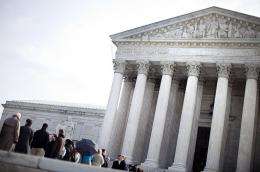Top US court considers major climate change case

Supreme Court justices appeared reluctant Tuesday to take a definitive stand in a key global warming case on the right of US states to regulate carbon emissions as a "public nuisance."
In considering an appeals court ruling in favor of a lawsuit filed by environmentalists, eight states and New York City, allowing them to sue utility companies over their greenhouse gas emissions, Justice Ruth Bader Ginsburg said the courts may not be the best forum for the fight.
"The relief that you're seeking, asking a court to set standards for emissions, sounds like the kind of thing that EPA does," she said, referring to the US Environmental Protection Agency.
Ginsburg said the environmental groups and states seem "to set up a district judge, who does not have the resources (or) the expertise, as a kind of super EPA."
Justice Samuel Alito noted also that the court did not know "what Congress may do down the road," and that there was possible conflict with action government agencies are working on.
Under President Barack Obama's tenure, the EPA has started a process of setting standards for emissions from fossil fuel power plants and petroleum refineries, the source of nearly 40 percent of US greenhouse emissions.
But with Republicans maintaining that carbon restrictions would drive up fuel prices and costs for businesses, Democrat lawmakers have been unable to pass a law mandating such restrictions.
The companies involved in the case, among others the American Electric Power Company and Tennessee Valley Authority, are responsible for 10 percent of US emissions, said the team representing the environmental groups and states.
The case, said the advocates, comes down to "the fundamental authority of the states to protect their land and citizens."
However in defense of the companies, Justice Anthony Scalia complained the environmentalists were "lumping them (power companies) all together.
"Suppose you lump together all the cows of the country. Would that allow you to sue all those farmers... cow by cow?" he asked.
The case could have a significant impact on the US approach to fighting climate change, with the power companies pressing to overturn the lower ruling, which the firms claim created a "regime for setting caps on greenhouse gas emissions based on 'vague and indeterminate nuisance concepts.'"
The potential compensation for the impact of climate change, the companies have argued, could "make the tobacco payouts look like peanuts."
In their view the move would allow an individual court's assessment "of what is 'reasonable'" compensation to the potential damage their output caused.
According to one of the environmental groups that brought the case, Open Space Institute, the appeals court's ruling set a "major precedent in that it gives citizens -- in the absence of climate change legislation -- the right to take action against big business pollution."
The lawsuit was brought by the groups, New York City, and the states of Connecticut, California, Iowa, New Jersey, New York, Rhode Island, Vermont and Wisconsin.
(c) 2011 AFP














